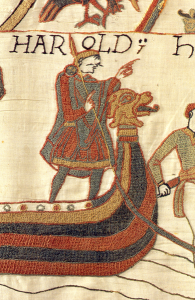What’s the Hurry, Time Team?
by Heather Pringle
May 1, 2009
 Let me get my confession out of the way first. I don’t spend much time in front of the television set and, until just a few days ago, I had never laid eyes on the immensely popular British show, Time Team.   Last week, however, I learned that this archaeological series is about to jump over the Atlantic: Time Team America will be premiering on PBS in July.  To introduce the new series, the Time Team people were out in force at the Society of American Archaeology meeting in Atlanta last week, so I decided to hunt down an episode on YouTube and see what the hoopla is all about.
Let me get my confession out of the way first. I don’t spend much time in front of the television set and, until just a few days ago, I had never laid eyes on the immensely popular British show, Time Team.   Last week, however, I learned that this archaeological series is about to jump over the Atlantic: Time Team America will be premiering on PBS in July.  To introduce the new series, the Time Team people were out in force at the Society of American Archaeology meeting in Atlanta last week, so I decided to hunt down an episode on YouTube and see what the hoopla is all about.
 For those who have missed it, Time Team is a kind of reality television show about archaeology.  Each week, the producers send a team of professional archaeologists on a dig somewhere in the U.K. , and they ratchet up the tension and drama for viewers by giving the excavators a huge deadline –three days to complete the entire dig. In the episode I watched, team members conducted extensive geophysical surveying, got out the earth-moving equipment, dug numerous trenches, excavated a big chunk of an Anglo-Saxon cemetery, removed ten bodies,  and analyzed some of the grave goods—all in 72 hours flat.   I felt exhausted just watching them.Â
I want to be fair here. There were a few things I liked about Time Team. I think the basic idea of showing an archaeological team working in the field is superb. And I really appreciated the producers’ efforts to explain to viewers some of the fundamentals  of archaeology—how finding a sherd from a 2nd century A.D. Samian bowl allows archaeologists to date part of a site or how physical anthropologists can tell whether a human skeleton is male or female.  This is good stuff. Â
But why impose such an insane deadline on the excavations? Archaeologists don’t work this way, except under extreme conditions, because it’s just so easy to miss or overlook vital data. The only dig I can think of that approached this kind of timeline took place in Iraq during the insurgency in 2005: there an international archaeological team risked their lives to excavate a mass grave for a war crimes trial in eight days. The longer they stayed at the grave, the more likely they were to be killed by insurgents.  Short of a situation like that, I can’t think of any acceptable reason to ramp up a dig so radically. Excavation is a destructive process: you don’t get a second chance to make good on your mistakes.
The relentless ticking of the clock in Time Team often gave the program a kind of surreal, Monty Python tone. At one point, for example, we see the team’s geophysicist poring over his data, desperately trying to pinpoint the location of the suspected Anglo-Saxon cemetery.  But the data was ambivalent and the poor man was clearly mystified. In real life, that would be a cue to stop and think things over. Not on Time Team. The chief archaeologist just waved him off and picked a spot blindly for excavation. “John [the geophysicist] is clearly not happy, but we have to get on, so we’re going to strip the area to the left of where the pipe is supposed to be,†the presenter notes blithely.Â
I hear from a colleague that newer episodes unfold at a more leisurely pace.  I’ll catch one when I can and let you know what I think  in a future blog.  But from what I’ve seen so far,  I don’t think Time Team is doing archaeology any favors. Â
Comments posted here do not represent the views or policies of the Archaeological Institute of America.






 Heather Pringle is a freelance science journalist who has been writing about archaeology for more than 20 years. She is the author of Master Plan: Himmler's Scholars and the Holocaust and The Mummy Congress: Science, Obsession, and the Everlasting Dead. For more about Heather, see our
Heather Pringle is a freelance science journalist who has been writing about archaeology for more than 20 years. She is the author of Master Plan: Himmler's Scholars and the Holocaust and The Mummy Congress: Science, Obsession, and the Everlasting Dead. For more about Heather, see our 



